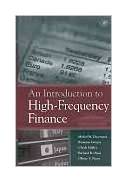|
||
• wydawnictwa polskie
• Zamów informacje o nowościach z wybranego tematu • kontakt
• Cookies na stronie |
AN INTRODUCTION TO HIGH-FREQUENCY FINANCEDACOROGNA M.wydawnictwo: AP , rok wydania 2001, wydanie Icena netto: An Introduction to High-Frequency FinanceOverviewLiquid markets generate
hundreds or thousands of ticks every business day. Data vendors such as Reuters transmit
more than 275,000 prices per day for foreign exchange spot rates alone. Thus,
high-frequency data are fundamental objects of study, as traders make decisions by
observing high-frequency or tick-by-tick data. The use of these statistics to understand
market microstructure is a fairly recent phenomenon, however, born of the use of
high-speed computers and mathematical techniques derived from physics. Olsen &
Associates of Zurich, Switzerland, are the leading researchers and practitioners in this
area. CONTENTS: Introduction Markets and Data Time Series of Interest Adaptive Data Cleaning Basic Stylized Facts Modeling Seasonal Volatility Realized Volatility Dynamics Volatility Processes Forecasting Risk and Return Correlation and Multivariate Risk Trading Models Toward a Theory of Heterogeneous Markets References Index "The authors have shaped the field of high-frequency data in finance; the text provides an excellent summary of their pioneering work." Paul Embrechts, Professor of Mathematics, ETI-l Zurich "An Introduction to High-Frequency Finance by the research team from Olsen & Associates is an amazing presentation of their work over the last decade and a half examining high-frequency, primarily currency, data. The volume includes details of data handling, filtering methods, scaling procedures, volatility models, automatic market making and trading rules that for many years were proprietary information. I highly recommend the book for anyone using high-frequency data." Robert Engle, Department of Finance, Stem School, NYU and Department of Economics, University of California, San Diego "At long last, the study of financial prices is moving beyond convenient oversimplifications. For providing much of the best data and an indispensable bridge between the financial and academic communities, this flowering is deeply indebted to the group led by Dr. Richard Olsen. This group and its alumni have also analyzed their own data. That work, which I often quote, has now been collected and extended in a book. I shall wear it out by constant use and it is a delight to recommend it to the emerging rational finance community." Benoit B. Mandelbrot, Sterling Professor of Mathematical Sciences, Yale University An Introduction to High-Frequency Finance is the first and only source of unified information about high-frequency data. It provides a framework for the analysis, modeling, and inference of high-frequency financial time series. With particular emphasis on foreign exchange markets, as well as currency, interest rate, and bond futures markets, this unified view of high-frequency time series methods investigates the price formation process and concludes by reviewing techniques for constructing systematic trading models for financial assets. 382 pages Księgarnia nie działa. Nie odpowiadamy na pytania i nie realizujemy zamówien. Do odwolania !. |


